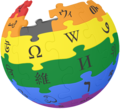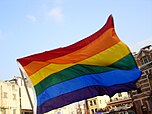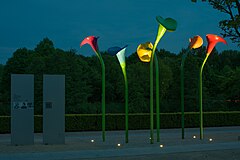| A request that this page title be changed to Portal:LGBTQ is under discussion. Please do not move this page until the discussion is closed. |
| Main page | WikiProjects & Things you can do |

|
The LGBTQ+ Portal |

|

|

|
Introduction LGBTQ (also commonly spelled LGBT, LGBTQ+, and LGBTQIA+) is an initialism of lesbian, gay, bisexual, transgender and queer or questioning. It is an umbrella term, broadly referring to all sexualities, romantic orientations, and gender identities which are not heterosexual or cisgender. In the 1990s, gay, lesbian, and bisexual activists adopted the term LGB, supplanting narrower terms such as "gay or lesbian". Terminology eventually shifted to LGBT, as transgender people became more accepted within the movement. Around that time, some activists began to reclaim the term queer, seeing it as a more radical and inclusive umbrella term, though others reject it, due to its history as a pejorative. In recognition of this, the 2010s saw the adoption of LGBTQ, and other more inclusive variants. Some versions of the term, such as LGBTQ+ and LGBT+ add a plus sign, to represent additional identities not captured within the acronym. Many further variants exist which add additional identities, such as LGBTQIA+ (for intersex, asexual, aromantic, and agender) and 2SLGBTQ+ (for two-spirit), or which order the letters differently, as in GLBT and GLBTQ. The collective of all LGBTQ people is often called the LGBTQ community. These labels are not universally agreed upon by everyone that they are intended to include. For example, some intersex people prefer to be included in this grouping, while others do not. Various alternative umbrella terms exist across various cultures, including queer, same gender loving (SGL), Gender, Sexual and Romantic Minorities (GSRM). (Full article...) Selected article - The first homosexual movement was a socio-political movement which thrived in Germany from the late nineteenth century until 1933. The movement began in Germany because of a confluence of factors, including the criminalization of sex between men (Paragraph 175) and the country's relatively lax censorship. German writers in the mid-nineteenth century coined the word homosexual and criticized its criminalization. In 1897, Magnus Hirschfeld founded the world's first homosexual organization, the Scientific-Humanitarian Committee, whose aim was to use science to improve public tolerance of homosexuality and repeal Paragraph 175. During the German Empire, the movement was restricted to an educated elite, but it greatly expanded in the aftermath of World War I and the German Revolution. Reduced censorship and the growth of homosexual subcultures in German cities helped the movement to flourish during the Weimar Republic. Between 1919 and 1933, the first publicly sold, mass-market periodicals intended for a gay, lesbian, or transvestite readership were published, although they faced censorship lawsuits and bans on public sale after the 1926 Trash and Smut Law. The first mass organizations for homosexuals, the German Friendship Society and the League for Human Rights, were founded in the aftermath of the war. These organizations emphasized human rights and respectability politics, and they excluded prostitutes and effeminate homosexual men, who were considered harmful to the movement's public image. The homosexual movement had limited success with the general public, in part because many Germans believed that homosexuality could be spread as a communicable disease. (Full article...)Selected biography -Quentin Crisp (born Denis Charles Pratt; 25 December 1908 – 21 November 1999) was an English raconteur, whose work in the public eye included a memoir of his life and various media appearances. Before becoming well known, he was an artist's model, hence the title of his most famous work, The Naked Civil Servant. He afterwards became a gay icon due to his flamboyant personality, fashion sense, and wit. His iconic status was occasionally controversial due to his remarks about subjects like the AIDS crisis, inviting censure from gay activists including human-rights campaigner Peter Tatchell. During his teen years, he worked briefly as a rent boy. He then spent thirty years as a professional model for life classes in art colleges. The interviews he gave about his unusual life attracted great curiosity, and he was soon sought after for his personal views on social manners and the cultivation of style. (Full article...)Selected quote -
—Heath Ledger (1979–2008)
Current events
Selected image - Pro and anti-Proposition 8 protesters rally as the California Supreme Court holds a session to determine the definition of marriage. Proposition 8 is a constitutional initiative that restricted the definition of marriage in California as that of between a man and a woman.
Did you know… -
This month's birthdays
Selected lists
Related portalsFeatured contentThe following articles and lists have been identified as some of the best produced by the Wikipedia community:
TopicsCategoriesAssociated WikimediaThe following Wikimedia Foundation sister projects provide more on this subject:
Discover Wikipedia using portals |























